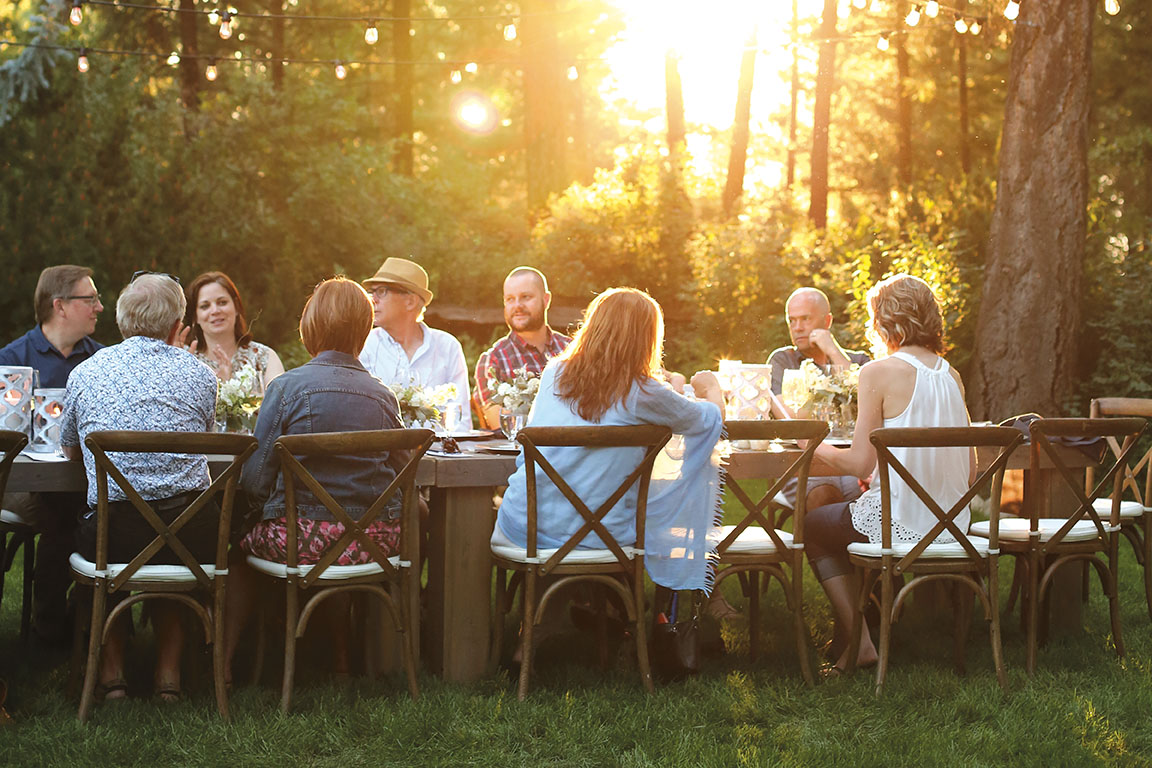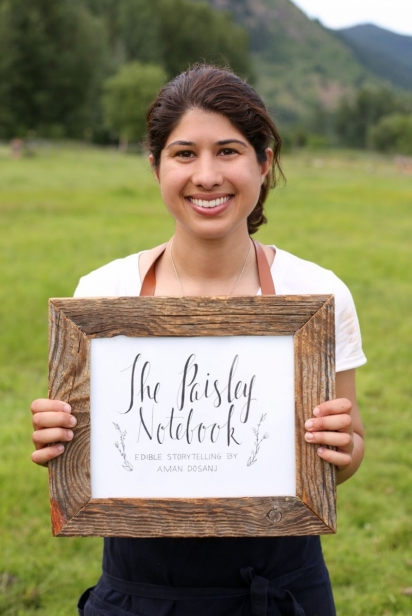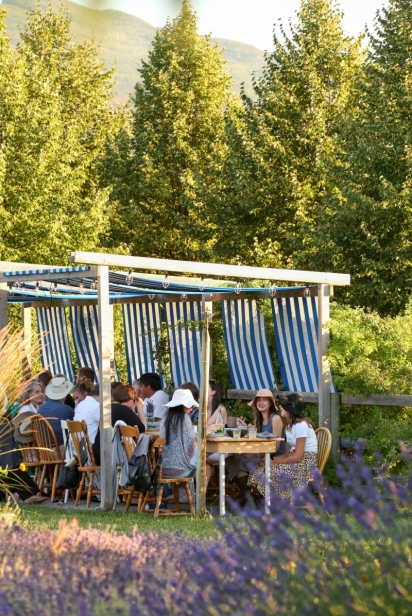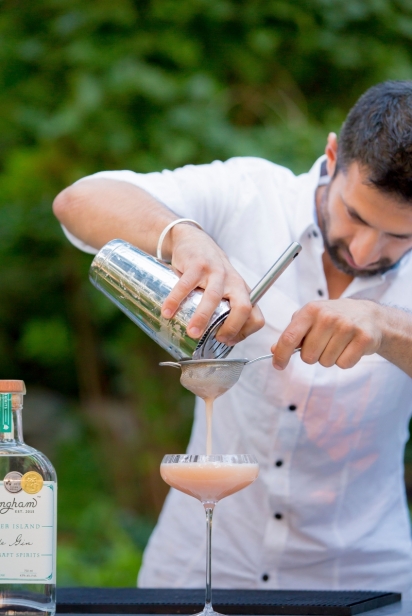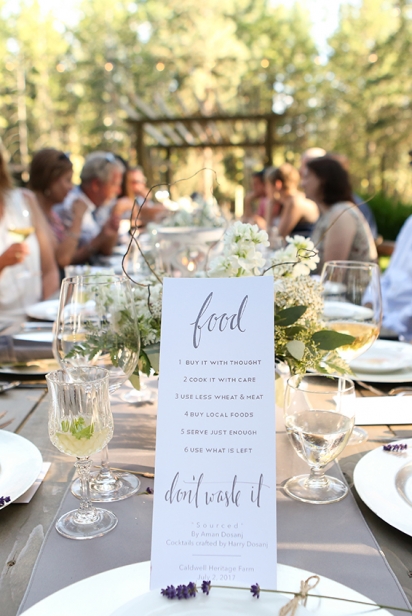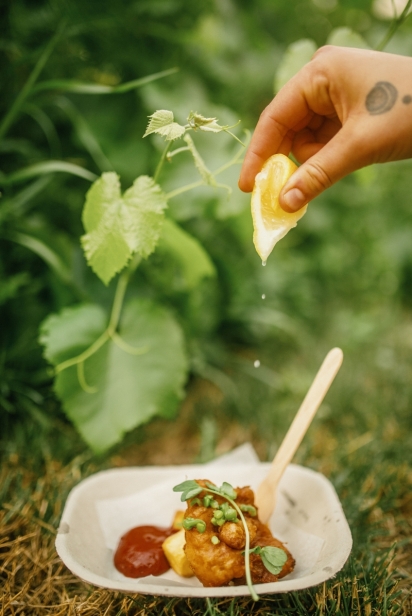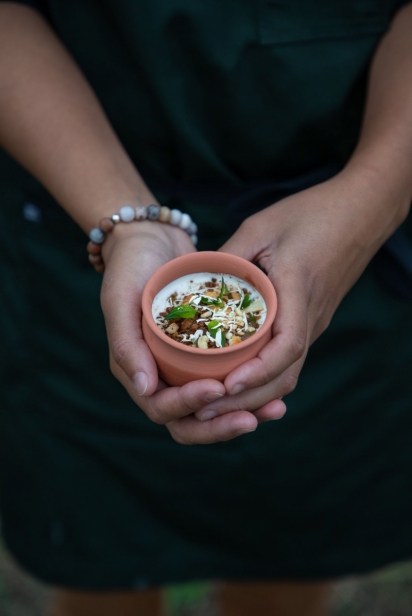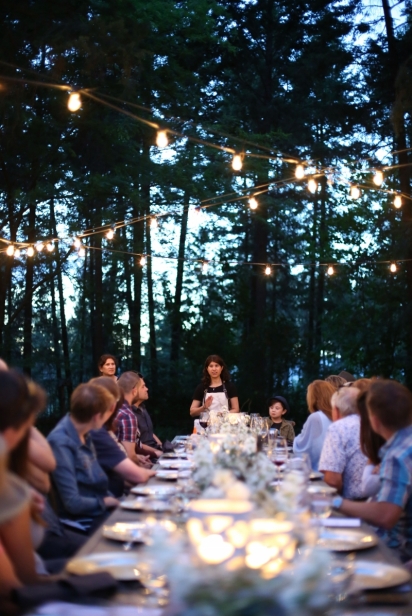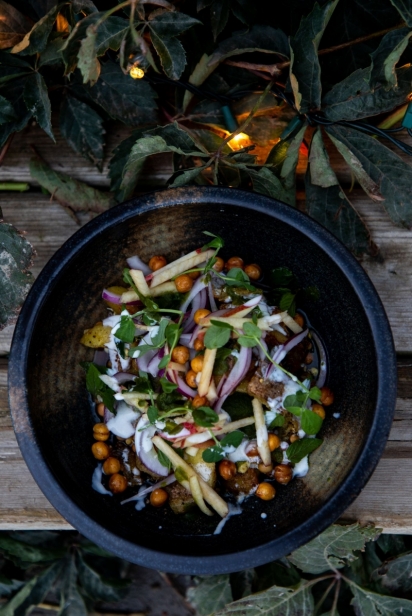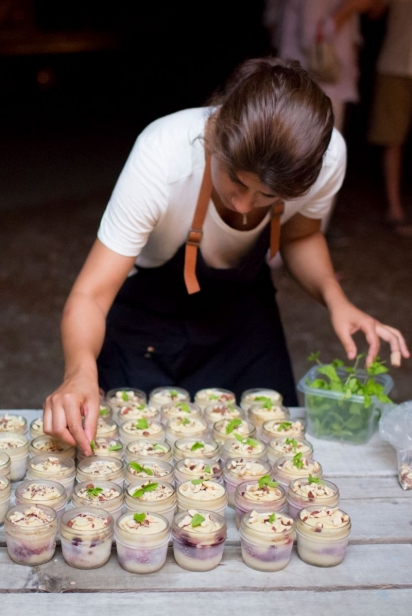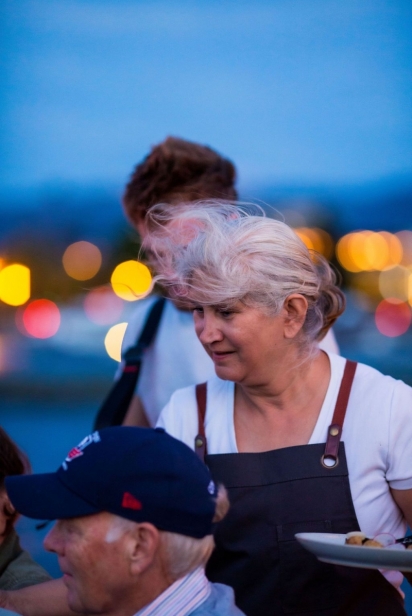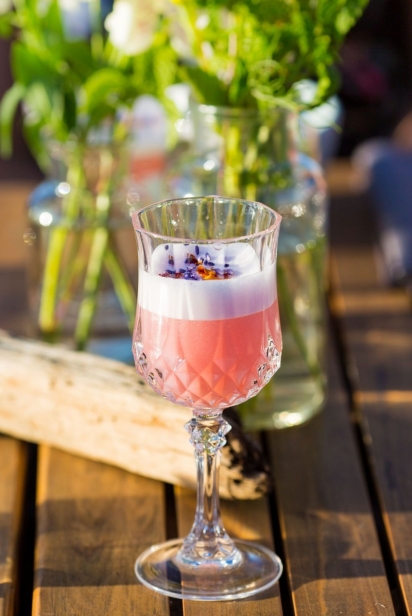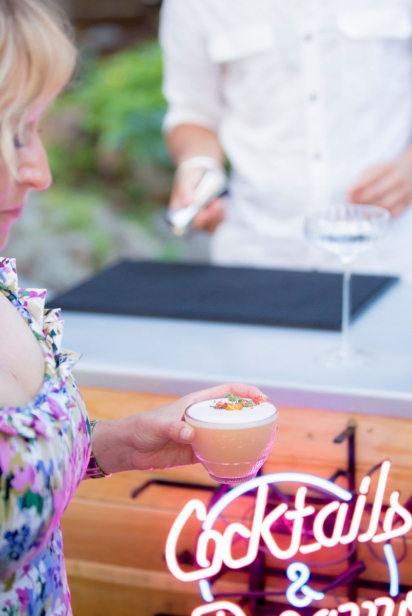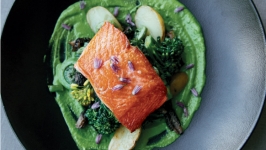The Storyteller in the Orchard
When you’re talking with Aman Dosanj, the conversation veers with whiplash speed from football (the British kind) to the decolonization of spices — from the dearth of women in high-end Indian kitchens to the importance of supporting local farmers the excellence of the ice cream at D Dutchman Dairy in Sicamous. In between, she teases her brother Harry and hugs her mother, Jas, and praises winemaker Rajen Toor and, above all, keeps an eye on the progression of dishes emerging fragrantly from the kitchen.
This is not your typical wine country dinner. Then again, maybe it should be.
SOURCED is a summertime series of pop-up dinners from Dosanj’s project The Paisley Notebook. Each long-table dinner is a celebration of fresh-from the-farm ingredients with Dosanj as chef and storyteller in charge, weaving the tale of her Indian and English and Canadian cultures in aromatic curries and hearty keema and brightly spiced sweets. But don’t call it fusion, because it isn’t.
"It’s not fusion when you draw from all aspects of your culture. It’s third-culture cooking,” Dosanj says. “It’s hard to define your identity, but food has a brilliant way of doing that.” She laughs a little. “It’s [a] diaspora kids’ secret weapon — paying respect to those who came before us and using ingredients that are grown with love.”
First course: Halibut cheeks in moili
Dinner tonight is at 99 Rows, a new winery and glassed-in event space in Lake Country — in fact, SOURCED is the first event ever held here. Rows of vines roll across the surrounding hills while across the lake the sun sinks behind the mountains, bathing everything in a ridiculously romantic rosy glow.
Out on the terrace, Harry Dosanj, also known as Bar Travelling Man, is shaking up a delicately plum-flavoured, tea-infused take on a daiquiri he calls Plumdog Millionaire. He’s often part of his sister’s dinners, and the sibling banter between the two makes you feel at times as if you are sitting down to a big, welcoming family dinner, only one where none of the big, scary topics are off the table.
As Dosanj says, “We can get into dark and twisty stuff around the dinner table, which is what the dinner table was always for.”
She started the dinners in 2017 and now hosts two a month from May to the end of August, with a few secret popups in between. The food is always South Asian and a celebration of local farmers, producers and winemakers. “It began as a social experiment,” she says. “It’s all about connecting us with where our food comes from. Everything has come from farms across the Okanagan and most of it is organic.”
Each dinner is held in a different space — this year’s series ranges from a farm in the Shuswap to a winery just south of Oliver. “The idea is to get you travelling and becoming tourists in our own valley,” she says, and jokes that she also wondered, “How far would people travel to eat our food?”
Tonight, the first course is halibut cheeks (from Codfathers in Kelowna) in moili, a mild coconut milk curry aromatic with ginger, served alongside farmer’s market spinach and topped with fried curry leaves.
The dish is paired with 2020 Sauvignon Blanc and Muscat co-ferment from Ursa Major Wines, where Rajen Toor is owner, winemaker and farmer.
Like Dosanj’s, Toor’s family also came from India, though a few decades earlier. (“We’re not related; we’re just brown,” Dosanj says cheekily.) Like so many others in the valley, Toor’s father and uncle arrived from the Punjab in the 1980s, bringing generations of farming skills with them. In 1988, they bought an old orchard on the Black Sage Bench. By the 1990s, they had converted it to vines, eventually began making their own wine and in 2003 had opened Desert Hills Estate Winery. “We grew up on the family vineyard,” Toor says. “It’s in my blood.”
Toor launched Ursa Major in 2016 to make fresh, lowintervention wines with unusual grapes and off-beat names like this one, which he calls “Song of the Sinner.”
“His wines are so beautiful,” Dosanj says. “They tell a story, a first-generation story, the good, the bad and the ugly.”
Second course: Mushroom keema
As guests wait for the second course, Toor pours his next wine, “Hello, My Name is Silly Goose,” a funky blend of carbonic-fermented Cabernet Franc, Syrah, Gamay and plums, and gives us a glimpse into the winemaker’s reality.
The last three years have seen an almost biblical litany of natural disasters in wine country: 2020’s pandemic and wildfires; 2021’s heat dome, more fires, sunburnt grapes and atmospheric river, a year so thick with smoke one winery cancelled its entire vintage; 2022’s cold, wet, brutal winter and late spring. And 2023 is getting off to a rough start too. All the talk this spring was about how much winter kill there was, how late the season is starting and how this is looking to be the third year in a row with unusually low yields.
“Because we are farming everything organically, everything is very vintage dependent,” Toor says. “We went from the hottest vintage on record to the coldest, wettest season on record. This past winter, we had record-breaking cold snaps [that] decimated everyone’s vineyards.”
And yet, while yields may be low, the vintages have been excellent, and this wine is a perfect example. Its bright candy nose and peppery plum flavours are a perfect foil for the next dish.
Keema is widely enjoyed across the subcontinent, usually featuring ground lamb or goat. Dosanj’s vegetarian version is made with smoked mushrooms from local producer What The Fungus. (“Obviously, it’s the Smoke-anagan,” she cracks dryly.) They are simmered with onions, tomatoes, spices and herbs. “Tomatoes and onions are the Holy Grail for brown people,” she adds. Alongside are crackers made with farro, which she calls “the OG of grain in the Okanagan.”
As we dig in, she tells us a little of her story.
“I never used to cook. I was a privileged little kid who had her mom and grandma to do the cooking. It was only when we moved to the Okanagan and opened the restaurant that I ended up stumbling into the kitchen,” she says.
Instead, she was meant to be a soccer star. She grew up in Southampton, U.K. and by age six was the only female football player on her school team. In 1999, when she was only 15, she played for Southampton Saints’ reserve team in an under-16s five-nations tourney in Dublin, becoming the first ever British-South Asian to play football for England at any level. At 16, she signed for Arsenal Ladies and, in 2002, at 18, she won a soccer scholarship to an American university.
That was the same year a movie called Bend it Like Beckham featured an actress named Parminder Nagra playing a character who, like Dosanj, was young, female, Sikh and a star soccer player. Suddenly, the media was paying attention, and she became a prominent anti-racism campaigner for football.
“People over here only know the food side of me and people in Britain only know the football side of me,” she says. “And I just want to be all of me.”
In 2008, the entire family upped stakes and moved to Kelowna, drawn by the weather and the produce. They didn’t like the food at the Indian restaurants they found here, so they opened their own, Poppadoms, where they made the family dishes they loved with local farm produce. “We were going farm to table and supporting local as much as we could.”
They closed Poppadoms in 2016, after Jas Dosanj had a heart attack. Aman Dosanj, meanwhile, had fallen in love with cooking, but not the brutal economic realities of the restaurant industry. She spent the months after they closed travelling, discovering her culture and learning a whole new way to feed people.
What came of that is SOURCED, where she can cook the food she loves, support the farmers who grow it and, perhaps most importantly, keep working with her family. “Mum has worked every single dinner next to me, and I think that’s really special because food has always been passed down mother to daughter in our culture,” Dosanj says.
Third course: Pandi
The dishes Dosanj serves at her SOURCED dinners are all Indian in origin, but don’t expect the all-too-familiar butter chicken and tikka masala every strip mall curry joint offers.
“With Indian food, there’s 4,000 years of wisdom that has been passed on from daughter to daughter to daughter to daughter,” Aman points out. It’s also a cuisine of regions that range from the cool mountains in the north to the blis tering heat of the south to the coastal climes of east and west.
Much of the cuisine Canadians know comes from the north — the samosas, tandoor chicken, naan and dairy-rich curries.
But Indian food also means the chutneys of Gujarat, the Portuguese-influenced vindaloos of Goa and the crispy fried dosas and pappadams of the south. It’s a big, complicated and crowded country, rich with spices and complex with the influences of trading partners, invaders and colonizers.
“I wanted to showcase that regionality and give it the respect it deserves,” Dosanj says, adding, “The brilliance of Indian food is that it can be surprising even to Indians.”
Dosanj has spent a great deal of time in India, often travelling with her mother, trying to learn those regional cuisines from professional chefs, home cooks, street vendors and even the army. (She has a family connection, of course.) Last fall, for instance, she ended up cooking on an all-female line at the famed Leela Palace in New Delhi. “I was the only diaspora kid on the lineup,” she says proudly, then frowns and points out that there are only four — four! — female executive chefs in a country of 1.4 billion people.
Her third course is a dish she learned from one of the line cooks at the palace. Pandi, an intensely fl avourful dry pork curry from the mountainous region of Kodagu, made with onions, cumin, “a really dark masala” and homemade yogurt made from D Dutchman milk, served with first-of-the season asparagus, rice from the Fraser Valley and dal made from organic red lentils. The pork comes from Covert Farms near Oliver, a regenerative family farm where the pigs lead “happy healthy lives” dining on organic vegetables.
Alongside, Toor pours a wine called “Recalling My Past and Future Lives,” an unprecedented co-ferment of Merlot and Gewürztraminer from a vineyard in Kaleden that he’s been keeping an eye on, waiting for the unicorn of growing conditions that would allow two such diff erent grapes to ripen at the same time. “It’s a really strange pairing in a vineyard, but I’ve been wanting to do a fi eld blend for long time,” he says.
It's that connection between one of the world’s biggest, oldest, most complex culinary cultures with the smallest detail of local farming that makes the SOURCED dinners so compelling. “The future of food is looking back and innovating at the same time,” Dosanj says. “If you don’t pay respect to the culture, why do it?”
Dessert: Chai-infused sticky toffee pudding
Of course, the story of food, especially when it comes from one of those complicated cultures, isn’t always pretty. Take the spice trade, which, starting about 4,000 years ago, wended its way along the Spice Road connecting the Mediterranean with Asia, travelling from China through India, Egypt, Persia, Arabia and Rome. Spices were worth more than gold and are still a precious commodity; however, then as now, the farmer is rarely the one making any money from it.
That’s an injustice Dosanj is trying to rectify with the collection of spice blends she sells on her website (paisleynotebook.com). They come from “a spice company that is trying to decolonize the space” and a percentage of the retail price goes to antiracism organizations. “It’s bringing it all together and getting people to see how it all happened,” she says.
Spice, after all, is at the heart of her food. Her mother taught her that “your food is only as good as your spices.” And so, we come to the final course, a chai-infused sticky toff ee pudding ice cream, a British dessert steeped in the colonial spice trade, as perfectly delicious a blend of Indian and English culture as one could imagine.
“I am proudly English Indian,” Dosanj says. “It’s a diff erent discussion around the table. It's all about trust. Showing up and knowing that it’s not going to be the same old dishes that you always fi nd. Th e whole idea of SOURCED is to get us closer to our food source, but it allows us to ask those questions as well.”
The Paisley Notebook
paisleynotebook.com | @paisleynotebook
Plumdog millionaire
Serves 1
Harry Dosanj has a mobile bartending business called Bar Travelling Man, but often pops up at his sister Aman’s SOURCED dinners, serving drinks such as this Okanagan-Indian cross-cultural sour.
1.50 ounces Flor De Caña rum infused with black tea
0.75 ounces lime juice
0.75 ounces port and plum reduction (see recipe)
0.75 ounces Green Croft Gardens egg white
For the tea infusion, stir 1 teaspoon of black tea leaves into 1 cup of aged rum (such as Flor de Caña). Infuse for 15 minutes then strain the tea leaves out. Infused rum will keep, sealed and stored in a cool, dark place, indefi nitely. Makes 1 cup.
In a Boston shaker, add the rum, lime juice, syrup and egg white, then dry shake for 5 seconds to create a foam. Add ice to the shaker, then shake well for 10 seconds until cold. Fine strain the mixture into a chilled coupe glass and enjoy.
Port and plum reduction
2¼ cups water
2½ cups sugar
2 ounces Port wine
1 cup puréed local plums
1 teaspoon The Paisley Notebook’s chai/baking spice
Add all ingredients to a medium pot, then simmer for 10 minutes. Remove from heat and cool to room temperature. Fine strain. Transfer to a sealable glass bottle or jar and keep, refrigerated, for up to two weeks. Makes about 3 cups.


